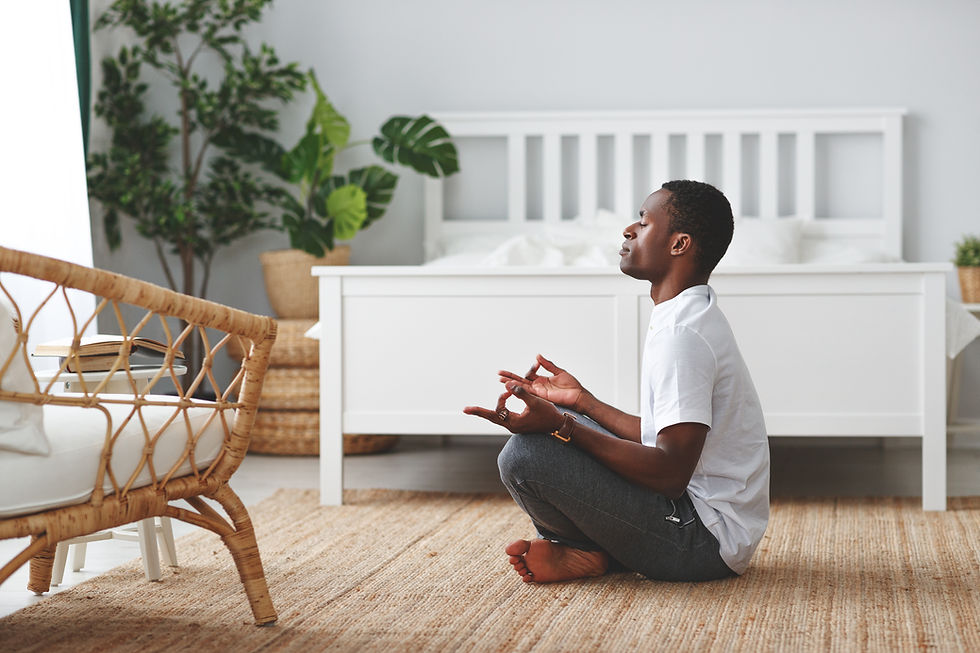What Is Yoga Therapy? A Whole-Person Approach to Healing
- Naomi Hurst

- Nov 6
- 4 min read
When people hear the word yoga, some many picture a bendy person in leggings doing impressive poses on a mat. While Asanas (or postures - see my other blog post on this) are part of yoga, they represent just a tiny fraction of a much deeper, more ancient healing system. Yoga Therapy invites us to go beyond the surface, to explore healing not just in the body, but in the mind, heart, breath, and spirit.

So, what is Yoga Therapy? And how is it different from a typical yoga class?
Yoga Therapy is the professional application of the principles and practices of yoga to promote health and wellbeing within a therapeutic relationship. It’s a personalised, evidence-informed approach that supports individuals dealing with specific health challenges, ranging from anxiety, chronic pain, and insomnia to conditions like dementia, Parkinson's, cancer, or trauma (this list is far from exhaustive).
Unlike general yoga classes, which are designed for general wellness, Yoga Therapy is tailored to the person in front of us, their needs, capacities, history, and goals.
The International Association of Yoga Therapists (IAYT) defines Yoga Therapy as “the process of empowering individuals to progress toward improved health and wellbeing through the application of the teachings and practices of yoga.”
It’s a form of complementary health care. It doesn’t replace medical treatment, but it can integrate beautifully with it, supporting recovery, relieving symptoms, and improving quality of life.
What makes Yoga Therapy special is its whole-person lens. Instead of focusing only on symptoms, it considers how every part of you, your body, mind, emotions, breath, lifestyle, and beliefs interconnects.
Most Yoga Therapists work with a framework that comes from yoga’s ancient roots as well as modern biomedical and psychological understanding. One such model is the Pañca Maya Kosha system, which sees the human being as made up of five layers or “sheaths”:
The physical body (annamaya), the breath and energy (pranamaya), the mind and emotions (manomaya), the wisdom body, including beliefs and inner knowing (vijnanamaya), and the bliss body, our sense of deep connection and peace (anandamaya).
A Yoga Therapist might explore with you how a chronic health condition (like back pain or fatigue) is impacting your thoughts, your breath, your sleep, your relationships, or your sense of hope. From there, they co-create a personal practice to bring support and balance across all of those levels.
This could include breath-led movement to support energy and mobility, restorative poses for nervous system regulation, breathing practices to calm anxiety or ease fatigue, meditation to build resilience or process emotions, yoga nidra or guided relaxation for deep rest, and even lifestyle support around sleep, routines, or mindset.
Yoga Therapy can provide profound support for those living with musculoskeletal issues like arthritis or back pain, mental health challenges such as anxiety or trauma, chronic conditions including fatigue or diabetes, and even those undergoing cancer treatment (with agreement from their specialist doctors). It can also help during transitional phases like menopause, support neurological health, and guide stress or trauma recovery.
Yoga Therapy is not a cure-all. But when practiced consistently and compassionately, it can become a deeply supportive companion. It’s about improving quality of life, easing suffering, and reconnecting with your own sense of agency and vitality.
You might be surprised to learn how much scientific research supports Yoga Therapy. Studies have shown that it can lower inflammation, improve heart rate variability (a marker of nervous system health), reduce pain and fatigue, ease anxiety and depression, and enhance sleep and overall quality of life.
And beyond what can be measured in blood tests or clinical scales, many people report a quiet transformation, feeling more grounded, more capable, and more at peace.
The relationship in Yoga Therapy matters deeply. It’s not about handing over a prescription; it’s about listening, observing, reflecting, and co-creating a path forward. The therapeutic relationship is based on trust, respect, and empowerment although home practices are part of the process, much like a self-administered prescription.
As a Yoga Therapist, I don’t see you as broken or in need of fixing. I see you as someone with wisdom, strength, and inner resources, who might just need the right tools, space, and support to remember that.
If you’ve ever left a yoga class thinking, “I wish that had been a bit more tailored to me,” or if you’re navigating a health condition and looking for a gentle, empowering path back to balance, Yoga Therapy might be the right fit.
It’s especially valuable for people who feel overlooked or unsupported by the conventional medical system, or for those who simply long for a more holistic, person-centred way to care for their body and mind.
Yoga Therapy isn’t about touching your toes or achieving a “perfect” pose. It’s about coming home to yourself and discovering tools that help you feel more grounded, more resilient, and more alive.
Whether you’re recovering from illness, living with stress or fatigue, or simply wanting to move through life with greater ease, yoga therapy offers a path forward. A path of curiosity, compassion, and connection.
Shortly at Doda Yoga, I will be offering Yoga Therapy sessions that are gentle, collaborative, and shaped around you. If you’re curious to explore how Yoga Therapy could support your wellbeing, please don’t hesitate to reach out, I am just finishing my intensive study over the last two and a half years and I hope to be in a position to offer Yoga Therapy in 2026.
Naomi Hurst






Comments